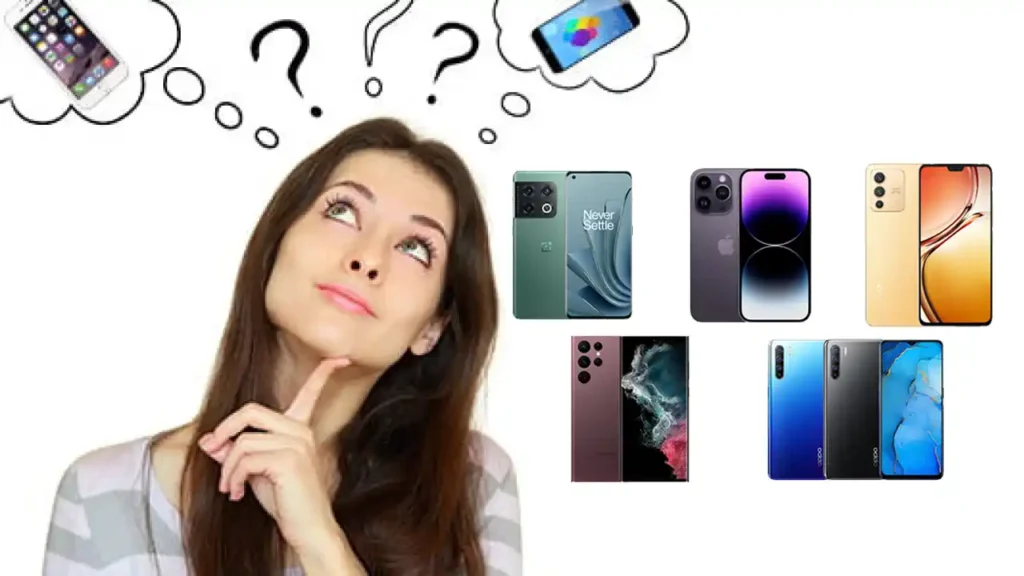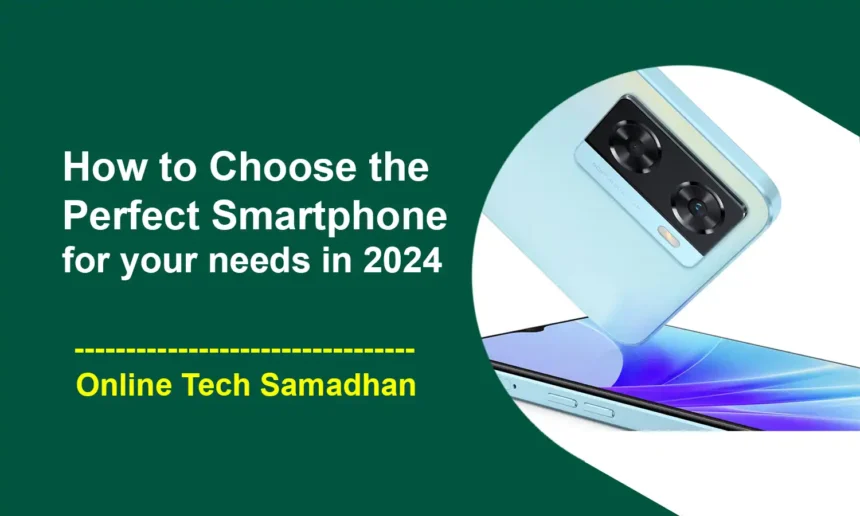How to Choose the Perfect Smartphone: A Simple Guide
Choosing the right smartphone is an important decision because it’s something you use every day. Now, smartphones have become more advanced, and there are many options to choose from. With so many choices, it can be hard to know which one is the best for your needs. Whether you need a phone for studying, playing games, taking photos, or just staying in touch with friends and family, there’s a perfect smartphone out there for you.
This guide will help you understand the different factors to consider How to Choose the Perfect Smartphone for your needs. We will talk about things like the phone’s display, camera, battery life, performance, and other features that are important. By the end of this post, you will have a good idea of what to look for in a smartphone and how to choose the one that’s right for you.

Understanding Your Needs
Think About How You Will Use the Phone
The first step in choosing the right smartphone is to think about how you will use it. Different people have different needs, so it’s important to figure out what matters most to you. For example:
- Are you a student? If you are, you might need a phone with good note-taking apps, a reliable internet connection for research, and a good battery life to last through the day.
- Do you like taking photos? If photography is your hobby, you’ll want a phone with a high-quality camera that can take sharp and clear pictures.
- Are you into gaming? If you enjoy playing games, you’ll need a phone with a fast processor and good graphics to ensure smooth gameplay.
- Do you travel a lot? If you’re always on the go, you might need a phone with a strong battery, good GPS, and strong connectivity.
By understanding your needs, you can narrow down your choices and focus on the features that matter most to you.
Budget Consideration
Another important factor is your budget. Smartphones come in a wide range of prices, from very affordable to quite expensive. It’s important to decide how much you are willing to spend on a smartphone.
- Budget Phones: These phones are affordable and offer basic features. They are good for people who don’t need a lot of advanced features and just want a phone for calling, texting, and browsing the internet.
- Mid-Range Phones: These phones offer a good balance of price and features. They are a good choice if you want some advanced features without spending too much money.
- Flagship Phones: These are the top-of-the-line models that offer the latest and greatest features. They are usually more expensive but are great if you want the best performance and features available.
Deciding on a budget will help you focus on the phones that are within your price range and ensure that you get the best value for your money.
Key Features to Consider
Display Quality
The display is one of the most important features of a smartphone because it’s what you look at every time you use the phone. There are a few things to consider when looking at a phone’s display:
- Screen Size: This is the size of the display measured diagonally. Larger screens are better for watching videos and playing games, while smaller screens are easier to hold and use with one hand.
- Resolution: This refers to the clarity of the display. Higher resolution means sharper images and text. Now, Most phones offer at least Full HD resolution, which is good for most tasks.
- Refresh Rate: The refresh rate is how often the display updates the image on the screen. A higher refresh rate (like 120Hz or 144Hz) makes the display smoother, which is especially good for gaming and scrolling through content.
Choosing the right display depends on how you plan to use your phone. If you watch a lot of videos or play games, a larger, high-resolution display with a high refresh rate might be best for you. If you just need a phone for basic tasks, a smaller display with standard resolution might be enough.
Camera Quality
The camera is another important feature, especially if you like taking photos or videos. Now, Most smartphones come with multiple cameras, each with its own purpose. Here’s what to consider:
- Main Camera: This is the primary camera that you’ll use for most photos. Look for a camera with a high megapixel count for sharp images, but remember that sensor quality is just as important as megapixels.
- Ultra-Wide Camera: This camera lets you take wider shots, which is great for landscapes or group photos.
- Telephoto Camera: This camera allows you to zoom in without losing image quality. It’s useful if you want to take pictures of distant objects.
- Front Camera: This is the camera you use for selfies and video calls. A good front camera should have enough megapixels to take clear photos and videos.
It’s also worth considering features like night mode, which helps you take better photos in low light, and video recording quality, especially if you plan to shoot a lot of videos.
Battery Life
Battery life is a critical factor, especially if you use your phone a lot throughout the day. Here are some things to consider:
- Battery Capacity: This is measured in milliampere-hours (mAh). A higher number usually means a longer battery life, but it also depends on how efficiently the phone uses power.
- Charging Speed: Some phones offer fast charging, which allows you to quickly charge your phone when the battery is low. Wireless charging is another feature to consider if you prefer a cable-free experience.
- Battery-Saving Features: Some phones have software features that help extend battery life by managing power consumption. This can be useful if you’re often away from a charger.
If you’re always on the go or use your phone heavily, look for a phone with a large battery and fast charging capabilities.
Performance and Speed
Performance is how well the phone runs apps, games, and other tasks. A phone with good performance will be fast and responsive, making it easier to use. Here’s what to look for:
- Processor: The processor (also called the chipset) is the brain of the phone. Now, look for phones with the latest processors, like those from Qualcomm, Apple, or MediaTek. These processors offer the best performance for gaming, multitasking, and running demanding apps.
- RAM: RAM is the memory that the phone uses to run apps. More RAM allows the phone to run more apps at once without slowing down. Now, most phones come with at least 4GB of RAM, but 6GB or more is better for heavy users.
- Storage: Storage is where your apps, photos, videos, and files are stored. Consider how much storage you need. Many phones offer 64GB, 128GB, or more. Some phones also offer expandable storage with a microSD card.
A phone with a fast processor, plenty of RAM, and enough storage will ensure that it can handle all your tasks smoothly, from gaming to multitasking.
Software and Operating System
The software and operating system (OS) determine how the phone works and what apps you can use. Now, there are two main types of operating systems:
- Android: Android is the most common OS, used by many different phone manufacturers. It’s known for being customizable and offering a wide range of apps. Android phones come with different versions of the OS, so it’s important to look for a phone that runs the latest version for the best experience.
- iOS: iOS is used only by Apple’s iPhones. It’s known for being user-friendly and offering a smooth experience. iPhones often receive regular software updates, which keep the phone running well over time.
When choosing a smartphone, think about which OS you prefer and what features are important to you. Some people prefer the flexibility of Android, while others like the simplicity and security of iOS.
Design and Build Quality
The design and build quality of a smartphone affect how it feels in your hand and how durable it is. Here’s what to consider:
- Materials: Smartphones are made from different materials like plastic, glass, and metal. Glass and metal phones often feel more premium, but they can also be more fragile. Plastic phones are usually more durable but may not feel as high-end.
- Size and Weight: Consider how comfortable the phone is to hold and carry. Larger phones can be harder to use with one hand, but they offer bigger screens for viewing content. Lighter phones are easier to carry, but some people prefer the solid feel of a heavier phone.
- Water and Dust Resistance: Some phones come with water and dust resistance ratings, like IP67 or IP68. This means the phone can withstand water splashes and dust, making it more durable in different environments.
Choosing a phone with the right design and build quality is important because it affects how long the phone will last and how much you enjoy using it.
Additional Features
In addition to the main features, there are some extra features that you might want to consider:
- 5G Connectivity: 5G is the latest generation of mobile network technology, offering faster internet speeds. If you live in an area with 5G coverage, a 5G phone can give you faster download and upload speeds.
- Biometric Security: Many phones now offer biometric security features like fingerprint scanners or facial recognition. These features make it easier and more secure to unlock your phone.
- Audio Quality: If you listen to a lot of music or watch videos on your phone, consider the audio quality. Some phones offer stereo speakers or high-quality sound features for a better listening experience.
- Expandable Storage: If you plan to store a lot of files, photos, or videos on your phone, look for a phone that offers expandable storage with a microSD card.
Conclusion
Choosing the perfect smartphone might seem difficult with so many options, but it becomes easier when you know what to look for. First, think about how you will use the phone and what features are most important to you, like the camera, battery life, or performance. Next, consider your budget and choose a phone that gives you the best value for your money. Remember to pay attention to the display, camera quality, battery, and other key features.
By understanding your needs and knowing what each phone offers, you can find a smartphone that fits your lifestyle and makes your daily tasks easier. Whether you need a phone for studying, playing games, or staying in touch with friends, there’s a perfect smartphone out there for you.




